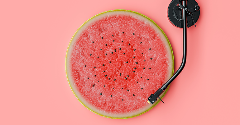News
Chicken protein now comes bottled for convenience
5 May 2020Singaporean workout enthusiast, Brian Chia, brought BE ALPHA meat-based protein smoothies to Singapore where he has found commercial success. He is now looking to expand his meal replacement beverage to the U.S. and other countries.
These smoothies come in two flavors, Yuzu Banana Chicken Protein Blend and Mango Coconut Chicken Protein Blend and feature chicken breast protein. Consumers can choose from 500 ml or 250 ml bottles. The larger format bottles contain 35g of protein and the smaller bottles have 32.5g. Each large bottle sells for $10 while smaller portions are $6.50. Monthly subscriptions are available for $148 per month or $259 per month depending on the size of the smoothie ordered.

In addition to lean chicken breast protein, the brand’s website says the smoothies are made with fresh fruit, live yogurt cultures and honey. There are no preservatives.
This novel idea was born out of necessity. Chia, who is a bodybuilder, reportedly tired of a lean chicken and broccoli diet that is famed as a workout recovery regimen, according to Meat + Poultry. Originally, he began blending up his meals to create savory smoothies, however, he quickly found that sweeter flavor profiles were more widely appealing and he began selling the prototypes out of his kitchen.
“Our smoothies eliminate the need to chew on dry and bland meat, in return attain that ideal macro through a refreshing and zesty blend that is very easy to drink,” according to the website.
Although Chia relies on fresh ingredients to compose the smoothies, the beverages have a 30-day shelf life thanks to the high-pressure processing (HPP) method used in the commercial packaging of BE ALPHA. This system employs pressurized cold water at up to 87,000 psi to inactivate microorganisms and extend a product’s shelf life without the use of preservatives.
BE ALPHA is not the only meal replacement on the market that touts its protein content. Worldwide there is fierce competition in the meal replacement category with brands like Soylent, Slimfast, OWYN and Après already on shelves. Britain’s Huel shook up the market several years ago when it released its powdered meal replacement brand that features plant-based protein. The brand, much like BE ALPHA, sees itself as a ready-to-go meal rather than a meal replacement and caters to time-poor people in a world where snacking is replacing the three traditional sit-down meals.
Research and Markets estimates the snack market to have a compound annual growth rate of 6.83% between 2017 and 2021; the segment was worth $89 billion in 2018.
Although BE ALPHA fits into the snacking category because of its convenience, the brand is clearly targeting consumers that are interested in protein – a large and growing category. Protein-rich diets have gained popularity in recent years. Research and Markets estimated the global protein ingredients market could reach $48.77 billion in 2025, primarily driven by functional foods and dietary supplements. By settling into a niche that caters both to consumers seeking convenience and an easy source of protein, BE ALPHA is setting itself up for success. However, it may find some pushback as consumers begin to favor more plant-based sources of protein over animal-centric sources.
Related news

Retail landscape lacks nutritious and affordable food, says ATNi
30 Dec 2025
A rapid increase in modern food retail has given retailers growing influence over consumer diets, according to global non-profit ATNi’s latest assessment.
Read more
Debate over ban on ‘meaty’ names for plant-based products reaches stalemate
26 Dec 2025
The debate over a ban on plant-based products using “meaty” terms has reached a stalemate, leaving manufacturers in limbo and still facing overhauls to their marketing and packaging.
Read more
Multi-sensory food and drink products to gain traction in 2026
16 Dec 2025
Trend forecasters predict that sensory elements will play a larger role, helping food and beverage brands differentiate themselves in a competitive market in 2026.
Read more
Big appetite for M&A between European and US food and drink companies
3 Dec 2025
Persistent tariffs on EU food and beverage exports have helped drive record levels of M&A activity between European and US companies this year, according to analysis by ING.
Read more
Non-UPF Program extends certification scheme to entire food industry
30 Nov 2025
The Non-UPF Program has extended its certification scheme to the wider food sector, championing a move towards healthier consumption habits.
Read more
Lancet study links UPFs to chronic disease risk
26 Nov 2025
UPFs are consistently associated with an increased risk of diet-related chronic diseases, according to a comprehensive review of global evidence in The Lancet .
Read more
Concerns swirl around cinnamon’s compliance with EU law
25 Nov 2025
Cinnamon may be a top functional ingredient, but it needs stronger protocols to ensure it meets EU food safety laws and quality standards, say researchers.
Read more
Oat Barista: Innovation for game-changing beverages
20 Nov 2025
Oat Barista is a clean label, sustainable, and innovative drink base specifically designed to create the perfect foam in one single ingredient.
Read more
How younger consumers are redefining ingredient choices and rejecting brand loyalty
18 Nov 2025
Gen Z and millennial consumers’ preferences for transparency, functionality, and purpose are “redefining the very nature of consumption itself”, says SPINS.
Read more
Hybrid formats and flexible positioning to disrupt category norms in 2026
17 Nov 2025
Trend forecasters expect food and drink to move more fluidly across occasions, functions, and formats as consumers seek versatility, novelty, and convenience.
Read more